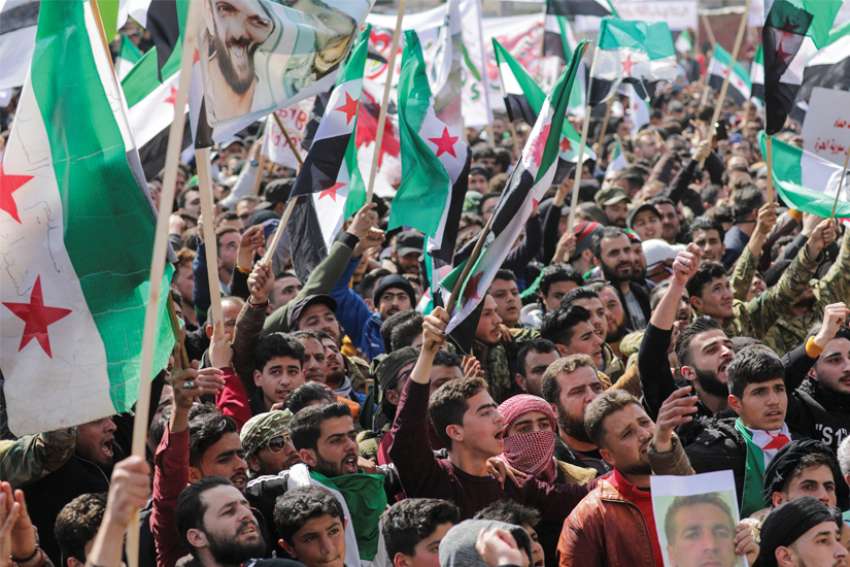“We urgently call on the international community, especially the European countries, to lift the unjust sanctions and boycotts on the Syrian people, who are not guilty,” Caritas Syria executive director Riad Sargi told an online press conference March 23.
After a decade of war, which has produced 5.6 million refugees plus 6.7 million internally displaced people, destroyed 50 per cent of the country’s health infrastructure, wrecked 35 per cent of its schools and left 13.4 million Syrians in need of humanitarian assistance, it’s clear that sanctions aren’t moving Syria towards peace, Sargi said.
“Time is running out. Many of the people have lost hope. Urgent and radical solutions are needed,” the Vatican’s nuncio to Syria, Cardinal Mario Zenari said. “The peace process, unfortunately, is in a deadlock.”
At this point sanctions are producing “no work, no factories, no reconstruction of houses, no dignity as a human being,” said Caritas Syria president Archbishop Jean-Abdo Abash.
Canada has no plans to abandon the co-ordinated international sanctions regime in place since 2011 and most recently renewed April 20, 2017, Global Affairs spokesperson Jason Kung told The Catholic Register.
“The Government of Canada mitigates unintended consequences of sanctions through humanitarian exceptions for activities such as the delivery of food, medicine and medical supplies, to limit the negative impact and potentially adverse effects on vulnerable groups,” Kung wrote in an e-mail.
Since 2011 Canada has put up over $800 million for humanitarian assistance and security measures.
On the 10th anniversary of the conflict, International Development Minister Karina Gould announced a promise of $49.5 million for food aid and health care in Syria.
House of Peace Foundation co-founder Elias Sadkni isn’t sure simply lifting sanctions will nudge Syria closer to peace.
“The question of peace is really complicated. I’m not really hopeful,” said Sadkni, who immigrated to Montreal in 2015. “You know it’s not a local conflict. It has never been a local conflict. I’m not expecting Syrians to meet together and reflect and find the solution.”
Sadkni still has family in Syria, who are certainly suffering under the sanctions. But both the economics and politics of the sanctions regime are complex. He finds himself unable to say whether lifting sanctions would actually benefit ordinary Syrians.
“Maybe any benefit will be also stolen by those in power, for their own benefit or for their war machine,” he said. “I’m not even sure whether lifting the sanctions will have a positive impact on the people themselves. I wish, I hope, and if that is the case, yes, I am for lifting the sanctions.”
Typical wages for Syrians able to find work is $15 per month. Yet it costs $350 a month to sustain a family of five at a subsistence level, according to Caritas Syria. With the collapse of the Lebanese economy next door, the economic picture is getting worse.
“I can’t imagine how people are surviving now inside Syria,” Sadkni said. “Without remittances, without external support, I don’t see how people can go on. And they cannot. From what I see, they can’t.”
Jesuit Refugee Service Middle East regional director Fr. Dan Corrou has seen the toll Syria’s never-ending deterioration has had on ordinary people.
“I have to say, in the last two months I have seen a marked lack of hope. That is a change,” he said.
The JRS operation in Syria, Lebanon, Iraq and Jordan is a major partner of Canada’s Caritas agency, Development and Peace, and of Canadian Jesuits International.
Young, dedicated professionals who work for the JRS in Syria have seen almost all their contemporaries leave, either through the United Nations High Commissioner for Refugees’ official process or via smuggling routes.
The JRS has recently been able to supplement the wages of its local staff to keep them on an even keel, or at least eating regularly.
“Even with that, the basic needs are becoming a question,” said Corrou. “Any savings have already been used, so there’s a sense of a real dire situation among people who, again, for 10 years made their clear and conscious decision that ‘I am Syrian and I am going to be here to be part of the solution.’ Even now they’re struggling with that decision.”
Corrou won’t wade into the complexities of either lifting or continuing sanctions. He notes that the Assad regime has been skilful in using the sanctions to portray themselves as victims.
“All of the problems can be blamed on the bogeyman, as it were, of the sanctions. It’s a perfect scapegoat.”
Rather than debating sanctions, Corrou would rather concentrate on the narrow and urgent tasks of getting health care, education and mental health support to Syrian families.

